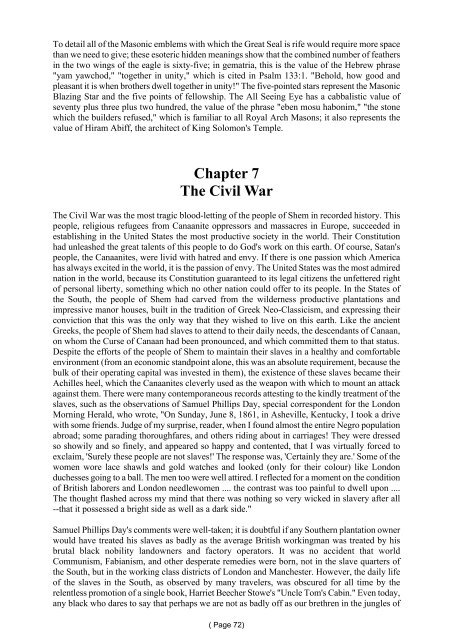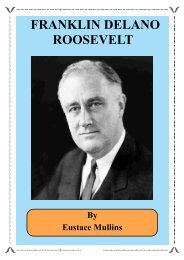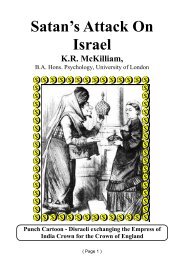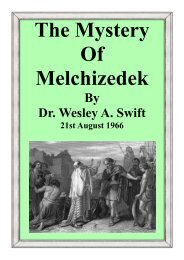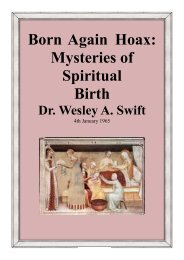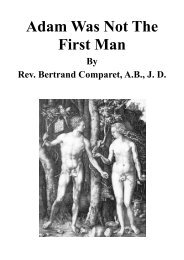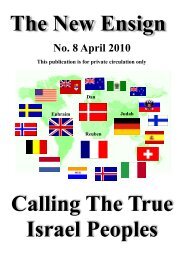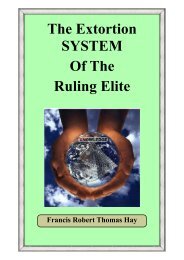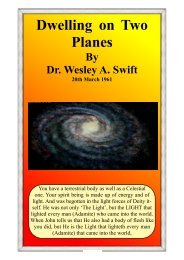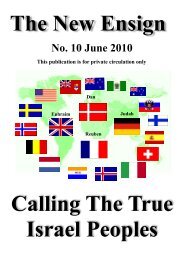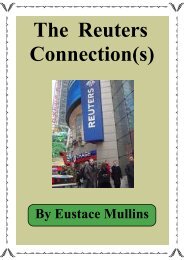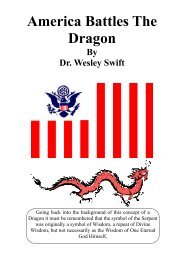Curse of Cannan - The New Ensign
Curse of Cannan - The New Ensign
Curse of Cannan - The New Ensign
Create successful ePaper yourself
Turn your PDF publications into a flip-book with our unique Google optimized e-Paper software.
To detail all <strong>of</strong> the Masonic emblems with which the Great Seal is rife would require more space<br />
than we need to give; these esoteric hidden meanings show that the combined number <strong>of</strong> feathers<br />
in the two wings <strong>of</strong> the eagle is sixty-five; in gematria, this is the value <strong>of</strong> the Hebrew phrase<br />
"yam yawchod," "together in unity," which is cited in Psalm 133:1. "Behold, how good and<br />
pleasant it is when brothers dwell together in unity!" <strong>The</strong> five-pointed stars represent the Masonic<br />
Blazing Star and the five points <strong>of</strong> fellowship. <strong>The</strong> All Seeing Eye has a cabbalistic value <strong>of</strong><br />
seventy plus three plus two hundred, the value <strong>of</strong> the phrase "eben mosu habonim," "the stone<br />
which the builders refused," which is familiar to all Royal Arch Masons; it also represents the<br />
value <strong>of</strong> Hiram Abiff, the architect <strong>of</strong> King Solomon's Temple.<br />
Chapter 7<br />
<strong>The</strong> Civil War<br />
<strong>The</strong> Civil War was the most tragic blood-letting <strong>of</strong> the people <strong>of</strong> Shem in recorded history. This<br />
people, religious refugees from Canaanite oppressors and massacres in Europe, succeeded in<br />
establishing in the United States the most productive society in the world. <strong>The</strong>ir Constitution<br />
had unleashed the great talents <strong>of</strong> this people to do God's work on this earth. Of course, Satan's<br />
people, the Canaanites, were livid with hatred and envy. If there is one passion which America<br />
has always excited in the world, it is the passion <strong>of</strong> envy. <strong>The</strong> United States was the most admired<br />
nation in the world, because its Constitution guaranteed to its legal citizens the unfettered right<br />
<strong>of</strong> personal liberty, something which no other nation could <strong>of</strong>fer to its people. In the States <strong>of</strong><br />
the South, the people <strong>of</strong> Shem had carved from the wilderness productive plantations and<br />
impressive manor houses, built in the tradition <strong>of</strong> Greek Neo-Classicism, and expressing their<br />
conviction that this was the only way that they wished to live on this earth. Like the ancient<br />
Greeks, the people <strong>of</strong> Shem had slaves to attend to their daily needs, the descendants <strong>of</strong> Canaan,<br />
on whom the <strong>Curse</strong> <strong>of</strong> Canaan had been pronounced, and which committed them to that status.<br />
Despite the efforts <strong>of</strong> the people <strong>of</strong> Shem to maintain their slaves in a healthy and comfortable<br />
environment (from an economic standpoint alone, this was an absolute requirement, because the<br />
bulk <strong>of</strong> their operating capital was invested in them), the existence <strong>of</strong> these slaves became their<br />
Achilles heel, which the Canaanites cleverly used as the weapon with which to mount an attack<br />
against them. <strong>The</strong>re were many contemporaneous records attesting to the kindly treatment <strong>of</strong> the<br />
slaves, such as the observations <strong>of</strong> Samuel Phillips Day, special correspondent for the London<br />
Morning Herald, who wrote, "On Sunday, June 8, 1861, in Asheville, Kentucky, I took a drive<br />
with some friends. Judge <strong>of</strong> my surprise, reader, when I found almost the entire Negro population<br />
abroad; some parading thoroughfares, and others riding about in carriages! <strong>The</strong>y were dressed<br />
so showily and so finely, and appeared so happy and contented, that I was virtually forced to<br />
exclaim, 'Surely these people are not slaves!' <strong>The</strong> response was, 'Certainly they are.' Some <strong>of</strong> the<br />
women wore lace shawls and gold watches and looked (only for their colour) like London<br />
duchesses going to a ball. <strong>The</strong> men too were well attired. I reflected for a moment on the condition<br />
<strong>of</strong> British laborers and London needlewomen .... the contrast was too painful to dwell upon ....<br />
<strong>The</strong> thought flashed across my mind that there was nothing so very wicked in slavery after all<br />
--that it possessed a bright side as well as a dark side."<br />
Samuel Phillips Day's comments were well-taken; it is doubtful if any Southern plantation owner<br />
would have treated his slaves as badly as the average British workingman was treated by his<br />
brutal black nobility landowners and factory operators. It was no accident that world<br />
Communism, Fabianism, and other desperate remedies were born, not in the slave quarters <strong>of</strong><br />
the South, but in the working class districts <strong>of</strong> London and Manchester. However, the daily life<br />
<strong>of</strong> the slaves in the South, as observed by many travelers, was obscured for all time by the<br />
relentless promotion <strong>of</strong> a single book, Harriet Beecher Stowe's "Uncle Tom's Cabin." Even today,<br />
any black who dares to say that perhaps we are not as badly <strong>of</strong>f as our brethren in the jungles <strong>of</strong><br />
( Page 72)


